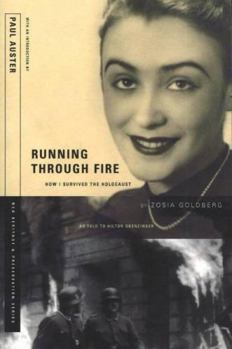Running Through Fire: How I Survived the Holocaust
Select Format
Select Condition 
Book Overview
A fellow Jew within the Warsaw Ghetto, offended by Zosia Goldberg's unaccented Polish, spat at her in Yiddish: "May you die amongst the goyem!" Zosia took this "curse" as a message from God. It sparked her escape from the Ghetto, convincing her that only by posing as a Gentile could she survive. And Zosia did not die amongst the goyem-but nearly. She was a "debrouillarde": she ran through fire without getting burned. Her story features resistance...
Format:Paperback
Language:English
ISBN:1562791281
ISBN13:9781562791285
Release Date:January 2004
Publisher:Mercury House
Length:187 Pages
Weight:0.60 lbs.
Dimensions:0.6" x 6.1" x 8.8"
Customer Reviews
4 ratings
Running Through Fire
Published by Thriftbooks.com User , 14 years ago
This book was great reading. Zosia's descriptions and story was vivid and told in such a compelling way that I felt as if I was there. It was hard to put the book down. This book is a keeper. Her story keeps alive what happend in WWII for those of us of a younger generation.
The Prewar and Holocaust Experiences of an Assimilated Polish Jew
Published by Thriftbooks.com User , 17 years ago
Zosia Goldberg traces her experiences in prewar Poland, war-torn Poland, and then wartime Germany (as a mislabeled forced Polish laborer). Goldberg tacitly attests to the fact that the prewar sympathy of Polish Jews towards Communism (the Zydokomuna) was widespread: "When I was going to school, I had feelings for communism, like all the young ones." (p. 7). She also frequently mentions her Communist-involved relatives (p. 8, 16, 29-30, 33). She absurdly refers to all prewar Polish political parties, excepting Pilsudski's, as Nazi parties (p. 7). In her ON THE EDGE OF DESTRUCTION, Celia Heller would have us believe that prewar assimilated Polish Jews suffered just as much from anti-Semitism as did the much more numerous non-assimilated Polish Jews. In contrast, Goldberg writes: "I did not suffer much, but the Jews in Poland did. Especially if you had a Jewish accent and could not speak Polish, people would always say hurtful things, like: `Dirty Jew.' With my dark eyes and hair, I never heard that I was a Jew. They called me a Gypsy instead--admiringly!" (p. 9). (Of course, this was generally true elsewhere. The relative infrequency of anti-Semitism in the west, compared to that in eastern Europe, owed less to the virtue of tolerance presumably possessed by westerners and more to the assimilated state of western Jewry). Goldberg herself experienced hatred of exceptional virulence not from Poles but from her unassimilated fellow Polish Jews. She comments: "There was a Jew with a big beard who I had never seen before, and I went over to him and asked, `What's happening? Could you tell me?' I could not speak Yiddish, so I spoke Polish to him. I think he understood me, but he got very angry that I did not speak Yiddish, so he spat on me, `Du solst starben zwischem goyim!'...'May you die amongst the goyim!'" (p. 39). The author provides a telling commentary on German conduct during the German-Soviet conquest of Poland in 1939: "It was a tremendous job to get to Warsaw because German planes were shooting everyone on the road. Everybody was running, and the Germans were shooting the refugees...They bombed the national shrines." (p. 12). In referring to Poles and Jews under the German occupation, Goldberg writes: "Everybody stole at the time..." (p. 20). This corrects Jan Tomasz Gross (FEAR) and his tacit mischaracterization of thievery as something in which Poles were the sole perpetrators and Jews the sole victims. From the earliest days of the German occupation, Goldberg had to contend with Jewish collaborators, including the Jewish Gestapo (pp. 23-24, 44), and Jewish informers who betrayed other Jews (p. 48, 133-134). She describes one roundup of Jews: "Along with the German Nazis, there were Ukrainians, Lithuanians, Latvians, and Jewish police." (p. 34). Throughout her book, Goldberg makes a sage distinction between ethnic Poles on one hand, and the Volksdeutsche on the other. For example, her experience with the Polish Blue Police (Policja
Welcome and highly recommended
Published by Thriftbooks.com User , 20 years ago
The latest addition to the Mercury House "NEA Heritage & Preservation" series, Running Through Fire: How I Survived The Holocaust by Zosia Goldberg is a welcome and highly recommended contribution to the growing library of Holocaust literature, memoirs, and biographies. Zosia Goldberg was a Polish Jew living within the warsaw Ghetto when she was rejected by a fellow Jew who cursed her in Yiddish and spat upon her to die among the "goyim" (non-jews). Taken that incident as a sign from God, Zosia escaped from the Ghetto and posed as a Gentile in order to survive the Nazi Holocaust that led to the almost complete extermination of the Warsaw Ghetto Jewish community. Running Through Fire is a gripping story of narrow escapes, help from unlikely sources, bitter betrayals by fellow Jews, and a dramatic struggle against human folly on the one hand and human depravity on the other. After surviving World War II and the Holocaust, Zosia came to America, married, and then moved to Caracas, Venezuela and worked in the garment business. Returning to America after her husband's death, she now lives in Florida where she was materially assisted by poet, novelist and critic in recording her life experiences for the benefit of future generations.
must read
Published by Thriftbooks.com User , 20 years ago
This is an amazing story that depicts the strength of a young woman in an impossible situation who relied on her bravery and intelligence.





